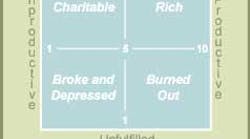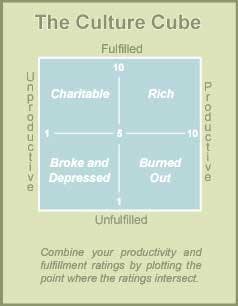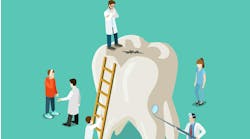Steven J. Anderson
Nothing is more costly to any business than losing a valuable team member. It might take months or years to find and train a replacement who can operate at the same level of productivity. In the meantime, the lost productivity will never be recovered. It is gone forever.
Your team is your practice's most valuable asset because patients value relationships with you and your team more than just the cosmetic dentistry you provide. It takes years to build those relationships. Lose a key team member, and you lose some of the relationships with your patients.
Working with dental practices for the past 15 years, I have heard the repeated refrain from cosmetic dentists who try to explain their reluctance to invest in educating and training their team: "I'm waiting to find the right team. When I have the right team, then we will get started."
Finding and building the right combination of team members is one of the most important things any dentist can do to build value into the practice. Most dentists look for new employees without realizing the practice, work environment, and office culture can attract or repel the best potential team members. Finding and keeping the right team is an inside-out proposition, not the other way around. The right kind of practice naturally attracts the right kind of team members. The right kind of team members - the best kind - want to stay in the best kind of office.
In early 2004, we presented to Qualified Members of the Crown Council the formula for building and -maintaining a powerful practice culture. Since then, offices throughout the country have seen improvements in their practices. A compelling work environment in your office will:
• create more loyal team members
• attract high-quality team members
• create word of mouth for your practice
• reduce stress
• increase job satisfaction.
What is "culture?"
It is not your ethnic origin, a bacterial growth, or your favorite symphony concert or art exhibit; culture is the emotional and behavioral work environment in your office. By design or default, every office, team, group, and organization has a culture created by the people in it. It is a powerful combination of personal:
• beliefs - closely held convictions about work and work ethics, other people, and life in general.
• attitudes - developed over time from previous experiences.
• vision and goals - for the office and people in it.
• office systems - the function, flow, predictability, and consistency of the work and service provided in the office.
• rules - knowing behavioral boundaries.
• office décor and physical environment - the influence of office surroundings.
• behaviors - actions and reactions to each other.
• expectations - spoken or unspoken assumptions we have about the behaviors of those around us.
The quality of your office culture affects:
• team harmony
• team work
• the type of team you attract
• the quality of patients you attract
• word of mouth
• stress level
• productivity
• profits
• overall work enjoyment and personal fulfillment.
Before you can take action to improve your office culture, you must understand where your culture is today.
Every dental-practice culture has two basic dimensions: productivity and fulfillment.
1) Productivity - How effective is your team at setting and achieving production and profit goals? To what degree can you set an objective as a team and execute the actions necessary to achieve the desired results? What are the results of your daily activity? Are you productive or are you just busy? (There is a difference.) On a scale of one to 10 with 10 being the highest, how productive is your team?
1 - 2 - 3 - 4 - 5 - 6 - 7 - 8 - 9 - 10
2) Fulfillment - How much personal satisfaction do you get from your professional efforts? Are you energized and enthusiastic about the differences you make every day? Or are you wiped out with the motions of drilling, filling, and billing, anticipating the moment you finish your last patient of the day so you can bolt and do something you love? On a scale of one to 10 with 10 being the highest, how fulfilled are you?
1 - 2 - 3 - 4 - 5 - 6 - 7 - 8 - 9 - 10
Now, combine both ratings by plotting the point where the two ratings intersect on The Culture Cube. The point you plotted on The Culture Cube can tell volumes about your current work environment. The quadrant in which your culture point resides might indicate where you are and where you might be able to go. Let's take a look at what each of these quadrants means.
The Culture Cube explained
Productive and unfulfilled - You might be working hard and producing a lot of dentistry, but something is missing. Passion and personal fulfillment are absent. You are burned out with little or no emotional energy or enthusiasm for what you do every day as a professional. Many dentists find themselves suffering from this condition. An office left in this condition eventually will lose quality team members, productivity will drop, and soon the office will find itself in the quadrant to the left.
Unfulfilled and unproductive - You are in big trouble! With no profit or emotional satisfaction, you find yourself broke and depressed. You probably are a dual candidate for bankruptcy and therapy!
Unproductive and fulfilled - How can you be both? If you have an avocation from which you get personal satisfaction, you know what it means to give yourself to a cause that is not necessarily a personally profitable venture, but worthwhile in some way. The danger comes when this begins - you love doing the dental work, but lack the courage to ask patients to pay fair fees or the ability to manage the practice properly for a reasonable profit. I call this the "activity trap" - you love what you do and are busy, but every day you dig yourself into a deeper financial hole. You are in practice doing the wrong kind of charity: giving away what should be paid for. You are alive; you just aren't making a living.
Fulfilled and productive - I call this being emotionally and financially rich! Every office culture needs to be, and we all strive for it. But we rarely find ourselves there by accident. It takes work, effort, and discipline to move an office culture to this quadrant and keep it there.
No matter where you plotted your point today, you can improve your office culture or maintain it in the right place. Here's how.
Think about the last member who joined your team. Do you remember the interview? Based on what you saw and heard, you formed a set of expectations for what that person would be able to do in your office. Similarly, new hires form opinions and set professional expectations based on what they observe, people they meet, and what people tell them before they join the team.
Positive expectations give us hope and motivation. But what happens when our expectations are not met? Suddenly, stress, frustration, disappointment, and anger dominate the psyche. Left uncorrected, these emotions can evolve into an office culture in which the emotional and behavioral work environment becomes toxic. How do you prevent this? Take two steps that will:
• cure an ailing culture;
• define a positive and productive office culture; and
• allow you the freedom to comfortably maintain a positive culture for the life of your practice.
Culture cure No. 1
If the biggest enemy to a positive office culture is unspoken expectations, then your first step is to define your behavioral expectations in writing for your entire team. Nothing is more frustrating for team members than to discover they are being measured by some undefined standard. Every day for them is like stepping into a minefield. They never know when they will misstep and ignite the boss or another team member. The opposite also is true. Dentists rarely know what team members expect from leaders.
The behavioral expectations for your office are not found in a job description, policy-and-procedure manual, or office checklist. They most often reside in the hearts and minds of those who work in the office. Once defined in writing and understood, a new level of teamwork can be achieved.
The first things you should define are things you assume any right, sane, logically minded employee should do. Assume nothing and clarify everything. Here are some examples of unspoken expectations you might have for your team that should be written down:
• Be on time - I talked with a frustrated dentist about trying to have a morning huddle when team members show up late, are not quite dressed, or put on makeup. I asked this dentist if the meeting's expectations had been defined in writing so that everyone knew his or her responsibility.
Remember - assume nothing.
This dentist began by writing down several expectations for that meeting as follows:
"Every team member is essential to our success. Meeting together first thing in the morning helps us plan for the day and work out our team game plan. To work as a team, each person agrees to be on time, dressed professionally, and prepared to work each morning at the designated time of our meeting."
•Don't gossip - Nothing is more destructive to an office culture than gossip. Unchecked, it can destroy the best working relationships. I've never met a quality team member who wasn't interested in working in a gossip-free office. Define it in writing:
"Building and maintaining good personal relationships is essential to teamwork. Inevitably, conflicts between team members will arise. When they do, each team member agrees to go directly to the person it involves and resolve the problem. It is unacceptable to talk about a conflict or concern about another team member outside of his or her presence. We agree to address a problem only with whom it involves."
Dental Office Culture Guide
As you find more unspoken expectations, develop a Dental Office Culture Guide. Your office culture guide might be several pages long. It should contain expectations you have of team members, their desired attitude, work ethic, and interpersonal behavior. (Sometimes it is easier to start with something that already exists, edit, then add to it. For an example of a Dental Office Culture Guide, send your email address or fax number to [email protected] with a reference to this article or call (888) CROWN-55.
Once you clarify your unspoken expectations, share the list with your team. Ask for input, and encourage them to add other expectations that will make your office a more harmonious, productive place to work.
Culture cure No. 2
Any idea is only as good as its implementation. Developing an office culture guide is the first step, but how you put it into practice is even more important. Here are six suggestions to keep your culture guide working so it creates the culture you desire:
• Radiate - You are being watched every moment of every day. Do everything you can to radiate the culture you expect. Be the example. When you fall short, admit it and let your team know you are working to improve in every area.
• Repeat - Repetition is the mother of learning. Every morning in your huddle, let a team member highlight one cultural expectation from your culture guide to keep it fresh.
• Recognize - Frequently acknowledge in front of the team someone who has positively exhibited a behavior from your culture guide. Remember, behavior that gets recognized gets repeated.
• Rehearse - During your monthly team meeting, pair team members and give them an office culture guide. Let each team member read the entire guide to his or her partner. Do it every month. The more emphasis you put on it, the more important it will become.
• Rate - Twice a year, distribute your office culture guide to team members. Tell them to rate themselves personally in each area of expectation based on their views of their own behaviors. Self-evaluation usually leads to self-improvement.
• Recruit - Use your office culture guide as a recruiting tool. As you interview candidates for any position on your team, give them copies of your office culture guide. Explain to them that your team has committed to working toward the culture outlined in that document and that if they were invited to join the team, they would be expected to make the same commitment. Clarifying expectations before hiring leads to better performance on the job.
Conclusions
By design or accident, your office has a culture - the behavioral and emotional work environment in your office.
• Your office culture determines your personal and professional success.
• You can build a strong office culture by being clear about unspoken expectations, defining those expectations in writing, and clearly communicating and explaining those expectations to your team using your office culture guide.
• Your office culture is strongly influenced and created by the people you chose for your team. Select them with care.
Now get started and make it happen!







